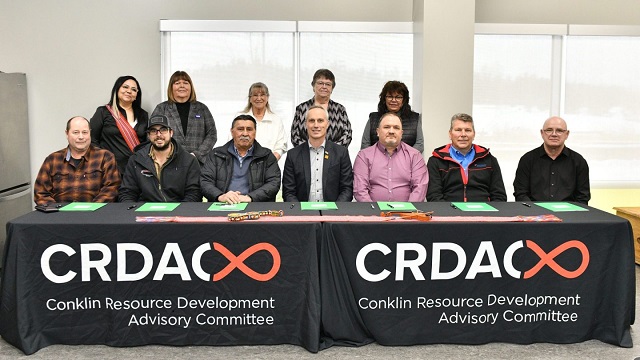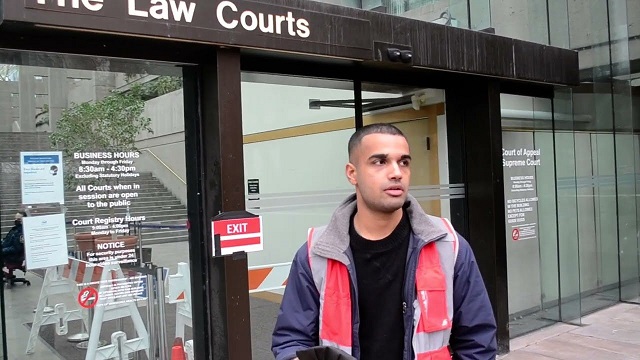Alberta
Northern Alberta Métis community launches seven new oil sands partnerships to boost economic opportunity

L-R (seated): Great Northern Bridgeworks president Steve Ross, Enviromulch Mulching & Logging superintendent Phil Mamers, Lynco Energy Services owner Doug Golosky, Surerus Murphy Joint Venture chairman Sean Surerus, Brothers HDD owner Jamie McClennon, Gateway Mechanical Services account executive Dean Seiz, Dorval O & M Services owner Brent Dorval (sitting in for Global Fusion Coating general manager Chad Olsen). L-R (standing): CRDAC directors Stacey Atkinson, Valerie Quintal, Shirley Tremblay, Margaret Quintal, and Grace Richards. Photo courtesy CRDAC
From the Canadian Energy Centre
About 150 kilometres south of Fort McMurray, the Conklin region is responsible for nearly 1/3 of oil sands production
The predominantly Métis community of Conklin has launched seven new business partnerships in a bid to lift its opportunities in one of Alberta’s busiest oil sands regions.
From drilling to heavy machinery and pipelines, the new ventures will bring an economic and social boost to the community of 300 residents about 150 kilometres southeast of Fort McMurray.
“We’d like to focus more on getting local opportunities such as training, employment, maybe some subcontracting, to build the local businesses up and build our people up for local employment,” said Valerie Quintal, president of Conklin Métis Local 193.
“We are going to be planning with each one of them how we could better serve our community members.”
Quintal is also a director of the Conklin Resource Development Advisory Committee (CRDAC), which brokered the deals with companies including Brothers HDD, Gateway Mechanical Services and Surerus-Murphy Joint Venture.
CRDAC was established in 2008 to help the community engage with growing oil sands development in the Conklin region, said CEO Scott Duguid.
The area has become a hub for development using a technology called steam assisted gravity drainage (SAGD), which involves drilling horizontal well pairs and steam injection to produce oil sands crude.
“It was really developed when a lot of the SAGD development was in the application or the environment assessment phase and there was a huge push for regulatory consultation and engagement with government on regulatory applications for SAGD,” he said.

Métis cultural heritage is displayed alongside a map of development activity in the Conklin region. Photo courtesy CRDAC
The area around Conklin is now home to six major oil sands projects owned by the industry’s biggest producers. This includes Cenovus Energy’s Christina Lake facility, the largest so-called “in situ” project in the oil sands.
As of January 2024, the region produced more than 550,000 barrels per day, or nearly one-third of all oil sands production, according to the Alberta Energy Regulator.
CRDAC has partnerships in place with the big players in the region including Cenovus, Canadian Natural Resources and MEG Energy, Duguid said (including a unique home construction program with Cenovus).
But the new ventures take opportunity to the next layer, with companies that service or work for oil sands producers, he said.
Duguid said the group has partnerships in place with the big players in the region such as Cenovus, MEG, CNRL, and Harvest.
“There’s a fair amount of wealth being generated in the region and out of the South Athabasca oilsands. There’s a lot of work happening,” said Duguid.
“We as sort of a community representative organization are trying to put our hands up with some of these smaller industry players and saying ‘hey, we’re here, we have community members, we have a potential workforce, we may need training, we may need some capacity to ensure that our residents can be meaningfully employed, but we can work with you and for you.’”
The hope is that partnering with these mid-level businesses will provide an opportunity for grassroots Conklin businesses to grow, he said.
Some of the revenue from the partnerships will come back to the community to support social programs such as healthcare, housing, and substance abuse treatment.
“It’s hugely significant for the community,” Duguid said.
Gateway Mechanical Services’ Dean Seiz said the company reached out to CRDAC last year to see if they would be interested in a working relationship.
“Basically, the long-term goal is to see if there are any community members that would be interested in maybe getting into the trades that Gateway does,” Seiz said.
The company, with its head office in Edmonton, provides heating, ventilation and air conditioning (HVAC), plumbing and refrigeration services across Western Canada. It has nine locations for regional offices with about 275 technicians.
“It’s a work in progress with Scott [Duguid] and the community to see what’s important to the community to make things work,” Seiz said.
Alberta
Former senior financial advisor charged with embezzling millions from Red Deer area residents

News release from Alberta RCMP
Former senior financial advisor charged for misappropriating nearly $5 million from clients
On April 4, 2024, the RCMP’s Provincial Financial Crime Team charged a Calgary resident for fraud-related offences after embezzling millions of dollars from his clients while serving as a senior financial advisor.
Following a thorough investigation, the accused is alleged to have fraudulently withdrawn funds from client accounts and deposited them into bank accounts he personally controlled. A total of sixteen victims were identified in the Red Deer area and suffered a combined loss of nearly $5 million.
Marc St. Pierre, 52, a resident of Calgary, was arrested and charged with:
- Fraud over $5,000 contrary to section 380(1)(a) of the Criminal Code; and,
- Theft over $5,000 contrary to section 344(a) of the Criminal Code.
St. Pierre is scheduled to appear in Red Deer Provincial Court on May 14, 2024.
“The ability for financial advisors to leverage their position to conduct frauds and investment scams represents a significant risk to the integrity of Alberta’s financial institutions. The investigation serves as an important reminder for all banking clients to regularly check their accounts for any suspicious activity and to report it to their bank’s fraud prevention team.”
- Sgt. John Lamming, Provincial Financial Crime Team
The Provincial Financial Crime Team is a specialized unit that conducts investigations relating to multi-jurisdictional serious fraud, investments scams and corruption.
Alberta
Political parties will be part of municipal elections in Edmonton and Calgary pilot projects

Strengthening Alberta’s local elections
Alberta’s government is introducing legislation to ensure Albertans can rely on transparent, free and fair elections, and municipally-elected officials have clearer accountability measures.
In a democratic society, Albertans expect their local elections to be free and fair, and their elected officials to be held to account by clear rules that govern their local councils. The Municipal Affairs Statutes Amendment Act proposes amendments to the Local Authorities Election Act (LAEA) and the Municipal Government Act (MGA) to add greater transparency to local election processes and ensure local councils and elected officials continue to remain accountable to the citizens who elected them.
“Our government is committed to strengthening Albertans’ trust in their local governments and the democratic process that elects local leaders. The changes we are making increase transparency for Alberta voters and provide surety their votes will be counted accurately. We know how important local democracy is to Albertans, and we will work with local authorities to protect and enhance the integrity of local elections.”
Local Authorities Election Act
Albertans expect free and fair elections and that’s why it’s important we strengthen the rules that govern local elections. To strengthen public trust in local elections, Alberta’s government will eliminate the use of electronic tabulators and other automated voting machines. All Albertans should be able to trust the methods and results of local elections; requiring all ballots to be counted by hand, clarifying rules and streamlining processes for scrutineers will provide voters greater assurance in the integrity of the results.
All eligible Albertans should be able to vote in local elections without impediment. Alberta’s government will limit the barriers for eligible voters to cast a ballot by expanding the use of special ballots. Currently, special ballots can only be requested for very specific reasons, including physical disability, absence from the municipality, or for municipal election workers. By expanding the use of special ballots, the government is encouraging more voter participation.
Amendments in the Municipal Affairs Statutes Amendment Act would increase transparency in local elections by enabling political parties at the local level. Political parties would be enabled in a pilot project for Edmonton and Calgary. The act will not require candidates to join a political party in order to run for a local or municipal office, but will create the opportunity to do so.
In addition, proposed changes to the Local Authorities Election Act would allow municipalities the option to require criminal record checks for local candidates, thus increasing transparency and trust in candidates who may go on to become elected officials.
Municipal Government Act
The role of an elected official is one with tremendous responsibility and expectations. Changes proposed to the Municipal Government Act (MGA) will strengthen the accountability of locally elected officials and councils. These include requiring mandatory orientation training for councillors, allowing elected officials to recuse themselves for real or perceived conflicts of interest without third-party review and requiring a councillor’s seat to become vacant upon disqualification.
If passed, the Municipal Affairs Statutes Amendment Act will also unlock new tools to build affordable and attainable housing across Alberta. Proposed amendments under the MGA would also create more options for municipalities to accelerate housing developments in their communities. Options include:
- Exempting non-profit, subsidized affordable housing from both municipal and education property taxes;
- Requiring municipalities to offer digital participation for public hearings about planning and development, and restricting municipalities from holding extra public hearings that are not already required by legislation; and
- Enabling municipalities to offer multi-year residential property tax exemptions.
Municipal Affairs will engage municipalities and other partners over the coming months to hear perspectives and gather feedback to help develop regulations.
Quick facts
- The LAEA establishes the framework for the conduct of elections in Alberta municipalities, school divisions, irrigation districts and Metis Settlements.
- The MGA establishes the rules governing the conduct of local elected officials once on council, as well as the overall administration and operation of municipal authorities in Alberta, including any policy those authorities may wish to implement.
Related information
-

 COVID-1914 hours ago
COVID-1914 hours agoPfizer reportedly withheld presence of cancer-linked DNA in COVID jabs from FDA, Health Canada
-

 Censorship Industrial Complex1 day ago
Censorship Industrial Complex1 day agoJordan Peterson, Canadian lawyer warn of ‘totalitarian’ impact of Trudeau’s ‘Online Harms’ bill
-

 Alberta2 days ago
Alberta2 days agoAlberta rejects unconstitutional cap on plastic production
-

 Alberta1 day ago
Alberta1 day agoAlberta official reveals ‘almost all’ wildfires in province this year have been started by humans
-

 Bruce Dowbiggin1 day ago
Bruce Dowbiggin1 day agoCome For The Graduate Studies, Stay For The Revolution
-

 Business2 days ago
Business2 days agoTaxpayers criticize Trudeau and Ford for Honda deal
-

 Business2 days ago
Business2 days agoDon’t be fooled by high-speed rail
-

 Alberta1 day ago
Alberta1 day agoPolitical parties will be part of municipal elections in Edmonton and Calgary pilot projects








